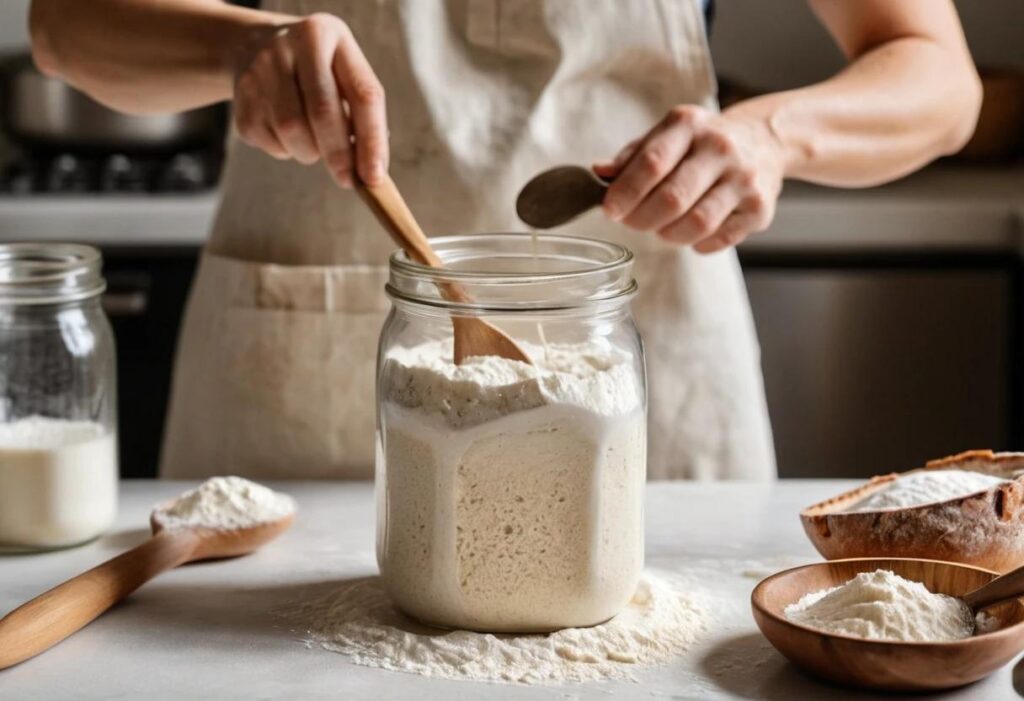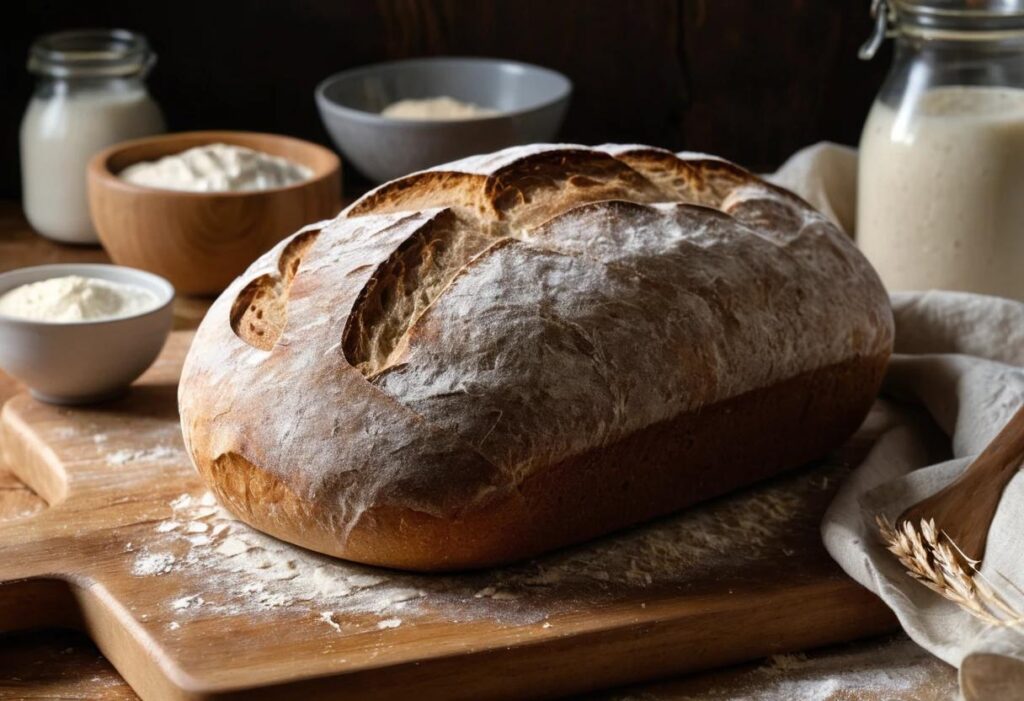“Have you ever wondered, why is sourdough bread not fattening? This question has puzzled many bread lovers who are trying to stay healthy while enjoying their favorite loaf.” Many consider sourdough bread a healthier choice compared to conventional bread, but why exactly? And most importantly, how is it not fattening when bread is often blamed for weight gain? Let’s unravel this mystery together. 🍞
Introduction to Sourdough Bread and Its Popularity
What Is Sourdough Bread?
Sourdough bread is no ordinary loaf. It’s made using a unique fermentation process involving wild yeast and lactic acid bacteria from a starter culture. Unlike commercial breads that rely on industrial yeast for quick production, sourdough takes its time to rise, resulting in a texture, taste, and nutritional profile that’s hard to beat.
“Sourdough isn’t just bread—it’s an experience of craftsmanship, health, and heritage.”
The History of Sourdough Bread
Dating back to ancient times, sourdough is believed to have originated in Egypt around 1500 BC. It remained the standard bread-making method for millennia until industrialized baking processes took over. While modern bread might be convenient, it’s missing the charm—and health perks—of sourdough.
Why Is Sourdough Bread Gaining Popularity?
There’s been a recent surge in people seeking whole, minimally processed foods, and sourdough fits the bill perfectly. It’s celebrated not just for its distinctive flavor, but also for its supposed health benefits, including better digestion, improved nutrient absorption, and, yes, being less likely to contribute to weight gain.
Understanding Calories and Nutritional Profiles in Bread
The Role of Calories in Weight Management
Calories are the energy currency of food. When we consume more calories than we burn, we gain weight. It’s that simple, right? Well, not quite. The quality of those calories and how they’re processed by your body play a huge role. That’s where sourdough bread has a leg up—it’s not just about the calories but how your body handles them.
Comparing Sourdough Bread with Regular Bread
What makes sourdough different? While calorie counts between sourdough and regular bread may not vary much, sourdough’s fermentation process transforms its nutritional composition. It reduces the glycemic index (GI), making it a smarter choice for those aiming to maintain or lose weight.
What Makes Sourdough Bread Unique?

The Fermentation Process in Sourdough
At the heart of sourdough’s magic is fermentation. The process is slow and natural, allowing wild yeast and bacteria to feast on the flour. This not only creates that characteristic tangy flavor but also pre-digests the gluten and starch, making it easier for your body to process.
Think of sourdough fermentation as a personal chef doing half the work for your stomach. It’s less strain on your digestive system and more nutrients absorbed.
Natural Ingredients and Their Impact on Health
Traditional sourdough uses just three ingredients: flour, water, and salt. Compare that to the long list of additives in most supermarket breads—preservatives, dough conditioners, and artificial flavors. Sourdough’s simplicity means fewer potential health risks and a more natural food source.
Glycemic Index: Why Sourdough Is Different
Bread’s glycemic index (GI) indicates how quickly it spikes your blood sugar. Sourdough, with its low GI, digests more slowly, helping prevent the infamous sugar rush and crash. This makes it an excellent choice for anyone looking to maintain steady energy levels and avoid weight gain.
Common Myths About Bread and Weight Gain
Does Bread Always Lead to Weight Gain?
Bread often gets demonized in diet culture, but it’s not the villain it’s made out to be. Weight gain is caused by consistently consuming more calories than your body needs, regardless of the source. The type of bread you choose, however, can influence your overall health and satisfaction.
Is Sourdough Bread Truly “Healthier”?
Not all bread labeled “sourdough” is the real deal. Some commercial brands add vinegar or sour flavors to mimic authentic sourdough. Always check the ingredients for live culture starters to ensure you’re getting the health benefits sourdough is famous for.
Why Sourdough Bread Is Not Fattening: Key Reasons
Lower Glycemic Load and Its Benefits
Sourdough’s low GI means your body digests it slowly, keeping blood sugar stable and reducing fat storage. It’s like the tortoise in the race: slow, steady, and always winning when it comes to your metabolism.
Better Digestibility Through Fermentation
The fermentation process partially breaks down gluten and starch, which can reduce bloating and discomfort for some people. If you’ve struggled with regular bread, sourdough could be a game-changer for you. 🌟
“Think of sourdough as the bread that works with your body, not against it.”
Reduced Cravings and Appetite Control
Because sourdough digests more slowly, it helps keep you fuller for longer. Unlike highly processed breads that leave you hungry soon after eating, sourdough satisfies.
Higher Nutrient Absorption in Sourdough
Phytic acid, a compound that can block the absorption of minerals like zinc and magnesium, is reduced during sourdough’s fermentation process. This means your body gets more out of every bite.
Scientific Evidence Supporting Sourdough Bread’s Benefits
Studies on Glycemic Control and Sourdough Bread
Research shows that sourdough bread has a significantly lower glycemic response compared to white or even whole-grain bread. This means less insulin is needed to process it, which is a boon for weight management and metabolic health.
Research on Gut Health and Sourdough Fermentation
Your gut microbiome plays a key role in your overall health, including weight management. Sourdough’s fermentation introduces beneficial bacteria that can improve gut health, aiding digestion and potentially influencing your body’s ability to manage weight.
Weight Loss Case Studies Featuring Sourdough
In one study, participants who incorporated sourdough bread into their diet experienced better blood sugar control and reported feeling fuller than those eating conventional bread. The science speaks for itself: sourdough is your ally in maintaining a healthy weight.
Common Problems People Face with Sourdough Bread
Misconceptions About Weight Gain and Bread
Many people are still wary of bread, thinking it’s inherently fattening. This outdated mindset prevents them from enjoying the benefits of sourdough, a bread that’s far from a dietary culprit.
Availability and Cost of Authentic Sourdough
Let’s face it: good sourdough can be expensive and harder to find. But don’t worry—making your own is both fun and rewarding. With a little patience and practice, you can have bakery-quality sourdough at home.
For inspiration, check out these sourdough cinnamon rolls.
Adjusting to the Taste and Texture
Sourdough’s tangy flavor and denser texture might not be for everyone at first, but it’s an acquired taste worth embracing. Once you fall in love with it, there’s no turning back.
Solutions to Maximize Sourdough Bread Benefits
Choosing the Right Sourdough Bread
Look for labels that specify “wild yeast” or “natural starter.” Avoid brands that use additives or shortcuts to replicate the flavor of real sourdough.
Incorporating Sourdough into a Balanced Diet
Sourdough pairs beautifully with a variety of nutrient-rich toppings like avocado, hummus, or smoked salmon. The possibilities are endless!
Explore these avocado toast variations for delicious pairing ideas.
Making Sourdough at Home: A Step-by-Step Guide
Start with a good starter culture, mix it with flour and water, and let time do the rest. Baking sourdough at home is like a science experiment with a tasty ending.
Practical Tips for Using Sourdough in Weight Management
Pairing Sourdough with Healthy Toppings
Think beyond the usual butter or jam. Fresh veggies, lean proteins, or even a drizzle of olive oil can elevate your sourdough into a nutritional powerhouse. 🥗
Portion Control: How Much Is Too Much?
Even with sourdough’s benefits, moderation is key. Stick to one or two slices per meal to keep your calorie intake in check.
Integrating Sourdough into Active Lifestyles
Sourdough’s slow energy release makes it ideal for pre- or post-workout snacks. Think of it as fuel for your body’s engine, keeping you running strong.

Conclusion: Why Sourdough Bread Can Be Part of a Healthy Diet
Summarizing the Unique Benefits of Sourdough:
Sourdough is more than just a trend—it’s a nutritional powerhouse. From its low glycemic index to its gut-friendly probiotics, it’s the bread that keeps on giving. ❤️
Encouraging Informed Choices in Bread Consumption
Bread doesn’t have to be the enemy. With authentic sourdough, you can enjoy all the taste and texture you love while supporting your health goals.
“With sourdough, you’re not just eating bread—you’re eating smarter, healthier, and happier.”
“Now that you know why sourdough bread is not fattening, it’s time to embrace it as part of your balanced diet without guilt!”

